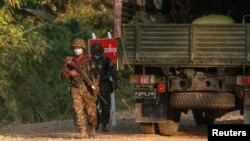The U.S. State Department has officially declared the military takeover in Myanmar a coup.
"After a careful review of the facts and circumstances, we have assessed that Aung San Suu Kyi, the leader of Burma's ruling party, and Win Myint, the duly elected head of the government, were deposed in a military coup on February 1," a State Department official said Tuesday.
The comments came a day after the military seized control of the country while detaining senior politicians.
The unnamed U.S. State Department official said on background the assessment of a coup "triggers certain restrictions on foreign assistance to the government" and that the U.S. "will take action against those responsible."
The U.S. will continue programs that help the country's citizens, including humanitarian assistance and democracy support initiatives, the official said.
The Myanmar military said its seizure, set to last one year, was necessary because the government had not acted on claims of voter fraud in November elections that were overwhelmingly won by the NLD. A new session of parliament had been due to begin Monday.
Senate Republican leader Mitch McConnell said in a statement that he spoke by phone Monday with U.S. President Joe Biden and applauded his response to the military takeover.
"The new administration deserves credit for approaching this situation in a way that's bipartisan and coordinated with Congress," McConnell said. "The world is watching. I hope and expect the United States will quickly make the obvious legal determination that this is a military coup, and impose significant costs on the military for its attack on democracy."
Myanmar's National League for Democracy called earlier Tuesday for the release of Aung San Suu Kyi, President Win Myint and other party leaders.
U.S. officials have "not been able" to speak with NLD members, the State Department official said, and added that "most of the senior officials are under house arrest."
Streets in Myanmar were quiet Tuesday, with phone and internet services running again and banks reopened.
Global reaction
International expressions of concern about the military's action were widespread, with multiple governments urging the military to respect the democratic process and release the detained officials. Biden threatened to impose sanctions.
"The United States will stand up for democracy wherever it is under attack," Biden said in a statement.
The United Nations Security Council is scheduled to hold an emergency meeting Tuesday to discuss the situation in Myanmar.
Britain's ambassador to the U.N. Barbara Woodward, who this month holds the council's rotating presidency, said the Security Council will examine "a range of measures" to uphold the November election and secure the release of Aung San Suu Kyi and the other detainees.
Growing tensions
Monday's developments followed months of tensions linked to the November elections. Myanmar's military said there had been voter fraud, an allegation rejected by the country's election commission.
On Saturday, the Tatmadaw, the official name of Myanmar's military, released a statement arguing that voter fraud had taken place and the international community "should not be endorsing the next steps of the political process on a 'business as usual' basis."
"The Tatmadaw is the one pressing for adherence to democratic norms," the statement read. "It is not the outcome itself of the election that the Tatmadaw is objecting to. … Rather, the Tatmadaw finds the process of the 2020 election unacceptable, with over 10.5 million cases of potential fraud, such as nonexistent votes."
Myanmar, also known as Burma, has long struggled between civilian and military rule but until the coup had been enjoying a hopeful transition to democracy.
A British colony until 1948, Myanmar was ruled by dictators backed by the military from 1962 to 2010.
An uprising in 1988 pushed for an election in 1990, which the NLD party won in a landslide, but the elected members of parliament were imprisoned, and the dictatorship continued.
Aung San Suu Kyi, the daughter of Myanmar's independence hero, General Aung San, who was assassinated in 1947, emerged as a leader in the pro-democracy rallies and in the NLD. She was awarded the Nobel Peace Prize in 1991 while under house arrest.
In 2010, Senior General Than Shwe announced the country would be handed over to civilian leaders, who included retired generals. They freed political prisoners, including the lawmakers from the National League for Democracy, and Aung San Suu Kyi, who was elected in a 2012 by-election and later became the state counsellor of Myanmar.
But Aung San Suu Kyi, 75, while popular among Myanmar's Buddhist majority, has seen her international reputation decline over her government's treatment of the country's mostly Muslim Rohingya minority.
In 2017, an Army crackdown against the Rohingya, sparked by deadly attacks on police stations in Rakhine state, led hundreds of thousands of Rohingya to flee to neighboring Bangladesh. The International Criminal Court is investigating the country for crimes against humanity.
VOA's Nike Ching contributed to this report.




